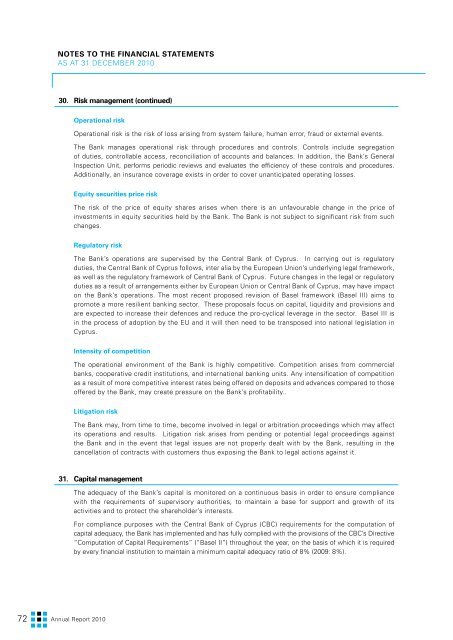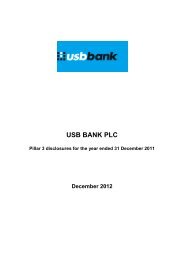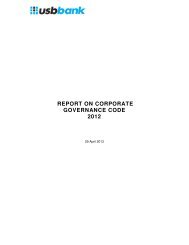Annual Report 2010 (PDF) - USB Bank
Annual Report 2010 (PDF) - USB Bank
Annual Report 2010 (PDF) - USB Bank
Create successful ePaper yourself
Turn your PDF publications into a flip-book with our unique Google optimized e-Paper software.
Notes to the Financial Statements<br />
as at 31 December <strong>2010</strong><br />
30. Risk management (continued)<br />
Operational risk<br />
Operational risk is the risk of loss arising from system failure, human error, fraud or external events.<br />
The <strong>Bank</strong> manages operational risk through procedures and controls. Controls include segregation<br />
of duties, controllable access, reconciliation of accounts and balances. In addition, the <strong>Bank</strong>’s General<br />
Inspection Unit, performs periodic reviews and evaluates the efficiency of these controls and procedures.<br />
Additionally, an insurance coverage exists in order to cover unanticipated operating losses.<br />
Equity securities price risk<br />
The risk of the price of equity shares arises when there is an unfavourable change in the price of<br />
investments in equity securities held by the <strong>Bank</strong>. The <strong>Bank</strong> is not subject to significant risk from such<br />
changes.<br />
Regulatory risk<br />
The <strong>Bank</strong>’s operations are supervised by the Central <strong>Bank</strong> of Cyprus. In carrying out is regulatory<br />
duties, the Central <strong>Bank</strong> of Cyprus follows, inter alia by the European Union’s underlying legal framework,<br />
as well as the regulatory framework of Central <strong>Bank</strong> of Cyprus. Future changes in the legal or regulatory<br />
duties as a result of arrangements either by European Union or Central <strong>Bank</strong> of Cyprus, may have impact<br />
on the <strong>Bank</strong>’s operations. The most recent proposed revision of Basel framework (Basel III) aims to<br />
promote a more resilient banking sector. These proposals focus on capital, liquidity and provisions and<br />
are expected to increase their defences and reduce the pro-cyclical leverage in the sector. Basel III is<br />
in the process of adoption by the EU and it will then need to be transposed into national legislation in<br />
Cyprus.<br />
Intensity of competition<br />
The operational environment of the <strong>Bank</strong> is highly competitive. Competition arises from commercial<br />
banks, cooperative credit institutions, and international banking units. Any intensification of competition<br />
as a result of more competitive interest rates being offered on deposits and advances compared to those<br />
offered by the <strong>Bank</strong>, may create pressure on the <strong>Bank</strong>’s profitability..<br />
Litigation risk<br />
The <strong>Bank</strong> may, from time to time, become involved in legal or arbitration proceedings which may affect<br />
its operations and results. Litigation risk arises from pending or potential legal proceedings against<br />
the <strong>Bank</strong> and in the event that legal issues are not properly dealt with by the <strong>Bank</strong>, resulting in the<br />
cancellation of contracts with customers thus exposing the <strong>Bank</strong> to legal actions against it.<br />
31. Capital management<br />
The adequacy of the <strong>Bank</strong>’s capital is monitored on a continuous basis in order to ensure compliance<br />
with the requirements of supervisory authorities, to maintain a base for support and growth of its<br />
activities and to protect the shareholder’s interests.<br />
For compliance purposes with the Central <strong>Bank</strong> of Cyprus (CBC) requirements for the computation of<br />
capital adequacy, the <strong>Bank</strong> has implemented and has fully complied with the provisions of the CBC’s Directive<br />
“Computation of Capital Requirements” (“Basel II”) throughout the year, on the basis of which it is required<br />
by every financial institution to maintain a minimum capital adequacy ratio of 8% (2009: 8%).<br />
72<br />
Αnnual <strong>Report</strong> <strong>2010</strong>






